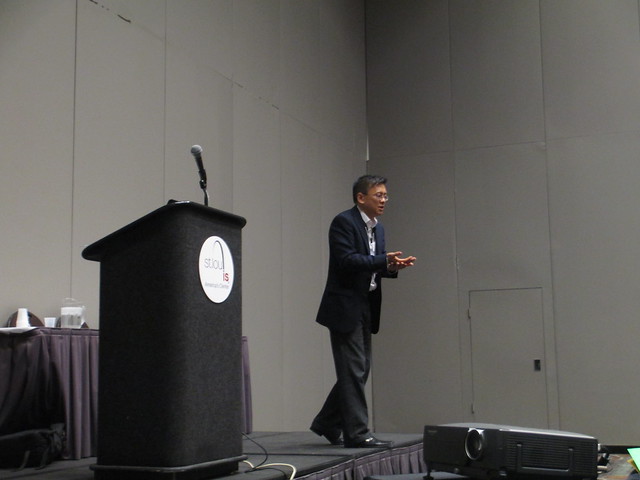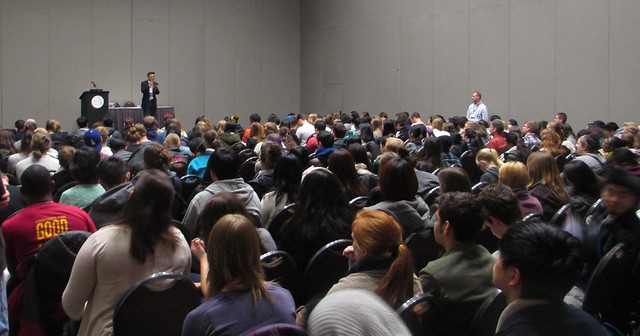Global poverty, inter-faith engagement, church planting: what do these require besides a prayerful spirit, a willing heart, and an available body? Greg Jao answers this question in this afternoon’s seminar, Developing your Mind for God’s Global Mission.
From Dec 27 – Jan 1, volunteers with our network of early career Christian academics are liveblogging seminars at the Urbana conference, a mission-focused student gathering of 16,000 Christians from across North America and the world. This post was co-written by Elsie Lee and Rebecca Carlson.
Greg Jao (@GregJao on Twitter) is a vice president and the director of campus engagement for InterVarsity/USA. He lives with his wife Jennifer and their two daughters in New York City.
Greg starts out by arguing that contrary to the message he grew up with in the church, the problems facing the world require not just a prayerful heart, but the very best minds. Greg quotes a passage of scripture he encountered while in his undergraduate studies. Col 1:15-20 makes a startling claim about who Jesus is – the agent of Creation who holds all things together. If Jesus is the goal of all things, we as Christians should approach the created world uniquely because God reveals himself in it and it is worthy of engagement. It means when we engage our minds, we have an opportunity to encounter God. Greg shares a story about his experience in chemistry class in high school. In a study about orbitals, he saw the periodic table and remembers thinking, “The world my God created is beautiful and elegant.” Greg realized that God was inviting him to discover something about who He was through the pages of his chemistry textbook. Worship was not contained at church on Sunday and Friday night youth group. He began to look at his studies as opportunities to study the world God made, from biology to the humanities. Another way to understand this, Greg says, is to think of the world as a garden that God created for us to engage with – there is a lot in it to explore and space for us to add to it. We see this in the beginning with Adam when he began to name the animals. He was developing a vocabulary to describe the universe. When Adam burst into poetry in meeting Eve, he used metaphor and language to describe their new relationship. When Adam and Eve came together, we see the beginnings of sociology and understanding how families form. These are the beginnings of culture, how we make sense of the world. God invites us into the creative process, whether we are engineers or architects, teachers or scientists. Every waking moment of our lives become an opportunity to worship and serve God. We can engage reality expecting to encounter Jesus and know him better. Greg refers to the character of Eric Liddell in Chariots of Fire, who says, “When I run, I feel God’s pleasure.” In the same way, Greg affirms those who are thinkers, “God made you smart, and that’s why you’re here. I hope you delight in that.” Having a missional mind means we take what we have and we turn it into something productive for the kingdom of God. It doesn’t mean everything we do has to be ‘Christian’. If God created all things, everything we do belongs to God. When we write a paper, Jesus redeems that square inch of academia for himself. While God may call some people away from their field of study into mission to do something completely different, he also calls people into their fields to create tools that help people and solve the world’s problems. Every discipline provides different tools and contribute to a richer picture of the world. The possibilities are endless. Greg suggests reading The Universe Next Door by James W. Sire to understand how to think in a Christian way. The Biblical narrative of creation and the fall, Jesus’ life, death and resurrection a powerful offers a tool to analyze anything that deals with the human experience. For example, from the discussion from the main session last night, God delights in the diversity of things. When God created human beings, he made male and female as different beings. If we believe Jesus has come to redeem all things, we believe that there is an economy of grace, which should give us courage as we engage in hard discussions about race and reconciliation. We believe that while not everything can be solved, we look forward to the redemption of all things. At the end times, the glory of God is increased as the diversity around the throne is increased. The tools currently in the field do not offer hope; Christians have a unique contribution to offer here. Greg emphasizes reading as one of the tools for developing a missional mind. He encourages those who don’t read that they need to read and those who read to read different things. “Books allow you to sit at the feet of people who have thought longer and harder about something than you have,” says Greg. There is something about spending a lot of time coming in contact with a subject. His advice is to “read and read broadly”. Read one book from a Christian perspective and one from a non-Christian, non fiction perspective to grapple with the reality around you, and engage with a piece of art or music which can offer perspectives that fiction or non fiction cannot. It becomes a richer reading experience. Greg also makes sure his Twitter feed and homepage point him to things that he doesn’t usually want to read about. He follows those who disagree with him because they teach him how to pray and have compassion. News outlets are filled with reports about how to pray from all around the world. How do you develop your mind? Have a conviction that you can meet Jesus by using your mind. Use tools to bring Christian thought to ask hard questions about the world.
Questions and Answers
What was your journey through law school and how are you putting your schooling to use?
Greg described his experience of deciding whether to practice law or to become an InterVarsity staff worker. While his family opposed the prospect of missionary work, Greg went to his community for advice about what he should do. While different friends gave him different advice, Greg reminds us that part of having a Christian mind is breaking out of your presuppositions and looking at scripture with people who are different from ourselves. They will see things we don’t. Every culture reads their cultural values onto the scriptures. Having a Christian mind requires engaging with diverse cultures. Greg went to law school and practiced law and enjoyed it all before coming on staff. For him, wise mentors, cultural analysis, and engaging with scripture helped him make that decision.
How do you avoid feeling broken by the falleness of the world as seen through the news?
Greg suggests leaning into community for support, engaging in prayer, and stepping back to worship. He points out that our broken hearts are the clearest sign that we are engaged in the brokenness of the world. A Christian mind helps him hold the tension between the brokenness of the world and the hope that God offers.
Is there a cost to over-analyze things?
There are certain personality types that are prone to this. One of the virtues needed for a Christian mind is humility “I will never know enough about what I should do,” says Greg. “But Jesus asks us to trust him.” Community is also helpful, as they can point out how we are avoiding decisions we need to make.
Can you share an experience of thinking that leads to doubt?
Christianity has proven remarkably resilient in the face of intellectual and academic questions for 2000 years. “You will encounter ideas that shake your faith,” says Greg, “Which is why you need to find community.” He found graduate students who were willing to talk with him about his questions in faith. One resource Greg points to is the Emerging Scholars Network (who publish this blog!) for students who are looking for mentors and community to think about issues more deeply. Greg also suggests reading books from Christian professors, not just pastors. Books and Culture is an example of another useful resource.
“Think hard, my friends,” says Greg, “God made you smart. Use all of what he gave you to glorify him.”
Other Books by Greg:
- Jao, G. (2012). Your Mind’s Mission. Urbana Onward.
- Jao, G. (2003). The Kingdom of God. InterVarsity Press. Lifeguide Bible Series.
- Yep, J., Cha, P., Van Riesen, S. C., Jao, G., & Tokunaga, P. (Eds.). (2009). Following Jesus without dishonoring your parents. InterVarsity Press.
- Cha, P., & Jao, G. (2000). Reaching Out to Postmodern Asian Americans. Telling the Truth. Grand Rapids: Zondervan.
Elsie recently graduated with a Master of Arts in Teaching English to Speakers of Other Languages from the University of Bath in the U.K. Her research focused on how English language teachers viewed the importance of teaching intercultural skills in their classrooms. Before her studies, she worked on staff with Inter-Varsity Canada for 6 years. She is fascinated by communication and relationships between people of different languages and cultures. A few favourite things include mentoring Asian women, rock climbing with her husband, and a good cup of coffee.



Leave a Reply